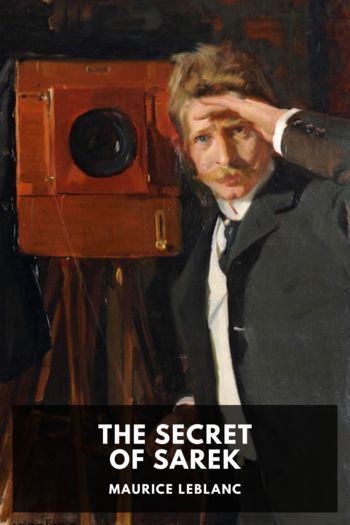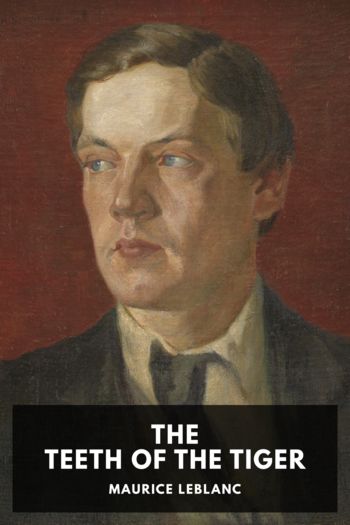The Secret of Sarek - Maurice Leblanc (easy to read books for adults list TXT) 📗

- Author: Maurice Leblanc
Book online «The Secret of Sarek - Maurice Leblanc (easy to read books for adults list TXT) 📗». Author Maurice Leblanc
Véronique held her down:
“You’re not going to be left alone, Honorine. I shan’t leave you.”
There was an actual struggle between the two women; and Honorine, pushed back on her bed by main force, moaned, helplessly:
“I’m frightened. … I’m frightened. … The island is accursed. … It’s tempting Providence to remain behind. … Maguennoc’s death was a warning. … I’m frightened. …”
She was more or less delirious, but still retained a half-lucidity which enabled her to intersperse a few intelligible and reasonable remarks among the incoherent phrases which revealed her superstitious Breton soul.
She gripped Véronique by her two shoulders and declared:
“I tell you, the island’s cursed. Maguennoc confessed as much himself one day: ‘Sarek is one of the gates of hell,’ he said. ‘The gate is closed now, but, on the day when it opens, every misfortune you can think of will be upon it like a squall.’ ”
She calmed herself a little, at Véronique’s entreaty, and continued, in a lower voice, which grew fainter as she spoke:
“He loved the island, though … as we all do. At such times he would speak of it in a way which I did not understand: ‘The gate is a double one, Honorine, and it also opens on Paradise.’ Yes, yes, the island was good to live in. … We loved it. … Maguennoc made flowers grow on it. … Oh, those flowers! They were enormous: three times as tall … and as beautiful …”
The minutes passed slowly. The bedroom was at the extreme left of the house, just above the rocks which overhung the sea and separated from them only by the width of the road.
Véronique sat down at the window, with her eyes fixed on the white waves which grew still more troubled as the wind blew more strongly. The sun was rising. In the direction of the village she saw nothing except a steep headland. But, beyond the belt of foam studded with the black points of the reefs, the view embraced the deserted plains of the Atlantic.
Honorine murmured, drowsily:
“They say that the gate is a stone … and that it comes from very far away, from a foreign country. It’s the God-Stone. They also say that it’s a precious stone … the colour of gold and silver mixed. … The God-Stone. … The stone that gives life or death. … Maguennoc saw it. … He opened the gate and put his arm through. … And his hand … his hand was burnt to a cinder.”
Véronique felt oppressed. Fear was gradually overcoming her also, like the oozing and soaking of stagnant water. The horrible events of the last few days, of which she had been a terrified witness, seemed to evoke others yet more dreadful, which she anticipated like an inevitable hurricane that is bound to carry off everything in its headlong course.
She expected them. She had no doubt that they would come, unloosed by the fatal power which was multiplying its terrible assaults upon her.
“Don’t you see the boats?” asked Honorine.
“No,” she said, “you can’t see them from here.”
“Yes, you can: they are sure to come this way. They are heavy boats: and there’s a wider passage at the point.”
The next moment, Véronique saw the bow of a boat project beyond the end of the headland. The boat lay low in the water, being very heavily laden, crammed with crates and parcels on which women and children were seated. Four men were rowing lustily.
“That’s Corréjou’s,” said Honorine, who had left her bed, half-dressed. “And there’s the other: look.”
The second boat came into view, equally burdened. Only three men were rowing, with a woman to help them.
Both boats were too far away—perhaps seven or eight hundred yards—to allow the faces of the occupants to be seen. And no sound of voices rose from those heavy hulls with their cargoes of wretchedness, which were fleeing from death.
“Oh dear, oh dear!” moaned Honorine. “If only they escape this hell!”
“What can you be afraid of, Honorine? They are in no danger.”
“Yes, they are, as long as they have not left the island.”
“But they have left it.”
“It’s still the island all around the island. It’s there that the coffins lurk and lie in wait.”
“But the sea is not rough.”
“There’s more than the sea. It’s not the sea that’s the enemy.”
“Then what is?”
“I don’t know. … I don’t know. …”
The two boats veered round at the southern point. Before them lay two channels, which Honorine pointed out by the name of two reefs, the Devil’s Rock and the Sarek Tooth.
It at once became evident that Corréjou had chosen the Devil’s Channel.
“They’re touching it,” said Honorine. “They are there. Another hundred yards and they are safe.”
She almost gave a chuckle:
“Ah, all the devil’s machinations will be thwarted, Madame Véronique! I really believe that we shall be saved, you and I and all the people of Sarek.”
Véronique remained silent. Her depression continued and was all the more overwhelming because she could attribute it only to vague presentiments which she was powerless to fight against. She had drawn an imaginary line up to which the danger threatened, would continue to threaten, and where it still persisted; and this line Corréjou had not yet reached.
Honorine was shivering with fever. She mumbled:
“I’m frightened. … I’m frightened. …”
“Nonsense,” declared Véronique, pulling herself together, “It’s absurd! Where can the danger come from?”
“Oh,” cried the Breton woman, “what’s that? What does it mean?”
“What? What is it?”
They had both pressed their foreheads to the panes and were staring wildly before them. Down below, something had so to speak shot out from the Devil’s Rock. And they at once recognized the motorboat which they had used the day before and which according to Corréjou had disappeared.
“François! François!” cried Honorine, in stupefaction. “François and Monsieur Stéphane!”
Véronique recognized the boy. He was standing in the bow of the motorboat and making signs to the people in the two rowing-boats. The men answered by waving their oars, while the women gesticulated. In spite of Véronique’s opposition, Honorine opened both halves of the window; and they could hear the sound of voices above the throbbing of the motor, though they could not catch a





Comments (0)